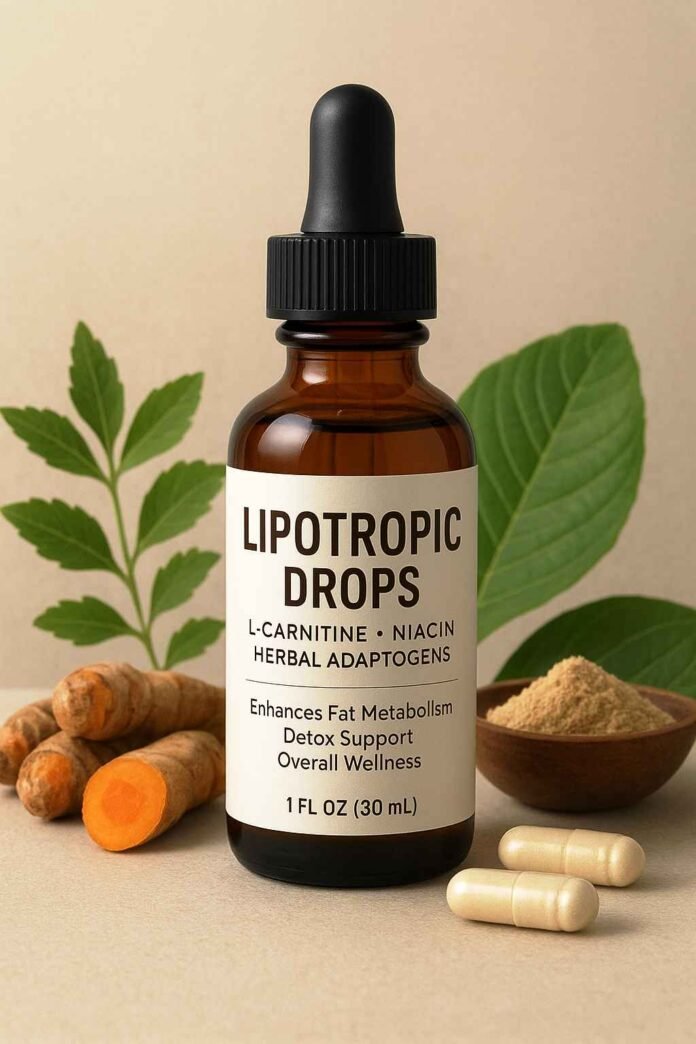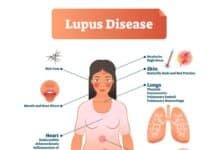
What Are Lipotropic Drops?
Lipotropic drops are liquid dietary supplements formulated with nutrients, amino acids, and herbal extracts that help your body metabolize fat more efficiently, improve energy levels, and support overall wellness. Unlike stimulants or synthetic fat burners, lipotropic drops work naturally by enhancing liver function, aiding detoxification, balancing hormones, and curbing sugar cravings.
These drops are commonly used by people on a weight loss journey, those who want better workout recovery, or anyone looking for a safe, natural metabolism booster.
Table of Contents
Key Benefits of Lipotropic Drops
Lipotropic drops are often referred to as “fat-burning drops” because of their ability to improve how your body handles fat and energy. Here are the top benefits:
1. Boost Fat Metabolism
Ingredients like L-carnitine help transport fatty acids into cells, where they’re converted into usable energy. This reduces fat storage and enhances stamina.
2. Increase Energy & Endurance
Nutrients such as niacin and beta-alanine improve circulation and reduce muscle fatigue, keeping you energized during workouts and daily activities.
3. Support Liver & Detox Function
Compounds like L-ornithine and astragalus promote natural detoxification, protecting the liver while flushing out toxins that slow metabolism.
4. Improve Mental Clarity & Mood
Adaptogens like Rhodiola Rosea and maca root reduce stress, enhance focus, and support hormonal balance—important factors for sustainable weight loss.
5. Enhance Immune & Digestive Health
With glutamine and herbal extracts, lipotropic drops strengthen immunity and support gut health, making it easier for your body to absorb nutrients.
Powerful Ingredients Inside Lipotropic Drops
Here’s a closer look at the nutrient-packed formula that makes lipotropic drops effective:
| Ingredient | Function |
|---|---|
| Niacin (B3) | Supports energy production, heart health, skin health, and blood sugar balance |
| L-Ornithine | Aids detoxification, reduces fatigue, boosts growth hormone production |
| L-Carnitine | Transports fatty acids for energy, supports fat metabolism, heart & brain health |
| Beta-Alanine | Reduces muscle fatigue, improves endurance, supports fat burning |
| L-Arginine | Enhances circulation, supports heart health, boosts nitric oxide levels |
| L-Glutamine | Aids muscle recovery, strengthens immunity, supports gut health |
| Rhodiola Rosea | Reduces stress, combats fatigue, boosts focus and performance |
| Maca Root | Balances hormones, enhances energy, improves mood and sexual wellness |
| Astragalus | Boosts immunity, reduces inflammation, supports liver health |
| Pygeum Africanum | Supports prostate and urinary health, provides anti-inflammatory benefits |
How to Use Lipotropic Drops for Best Results
To maximize the benefits of lipotropic drops, follow these guidelines:
- Daily Consistency – Take drops at the same time each day to regulate metabolism and maintain steady fat-burning support.
- Combine with a Healthy Diet – Pair with nutrient-dense whole foods for long-term results. Processed foods reduce their effectiveness.
- Stay Hydrated – Adequate water intake helps with detox and fat metabolism.
- Exercise Regularly – Drops enhance endurance, but exercise amplifies fat-burning and muscle recovery.
- Buy from Trusted Sources – Avoid counterfeit products online. Purchase only from reputable brands or healthcare providers.
Are Lipotropic Drops Safe?
Generally, lipotropic drops are considered safe when taken as directed. Since they contain natural amino acids, vitamins, and herbal extracts, most users tolerate them well. However:
- Possible mild side effects: nausea, digestive upset, or headaches in sensitive individuals.
- Consult your doctor: especially if you’re pregnant, nursing, or taking medications.
- Avoid overdosing: more is not better—stick to the recommended dosage.
Lipotropic Drops vs Lipotropic Injections
Some people wonder whether lipotropic injections are better than drops.
| Drops | Injections |
|---|---|
| Easy to use (oral liquid) | Requires medical administration |
| Can be taken at home | Usually done in clinics |
| Gradual absorption through digestion | Direct, faster absorption into bloodstream |
| Lower cost | More expensive |
| Safe for beginners | Recommended for advanced medical weight loss plans |
Verdict: For most people starting out, lipotropic drops are a safer and more convenient choice. Injections may be better for those under medical supervision with significant weight loss needs.
Tips to Maximize Lipotropic Drop Benefits
- Pair with high-protein meals to support muscle recovery.
- Avoid excessive sugar and processed foods.
- Include strength training and cardio for faster results.
- Get adequate sleep, since drops also help regulate circadian rhythms.
Frequently Asked Questions
1) What are lipotropic drops and how do they work as a metabolism booster and fat-burning support?
Answer :
Lipotropic drops are liquid dietary supplements formulated as a lipotropic blend — typically a combination of B-vitamins (often B12/niacin), amino acids (like L-carnitine, L-ornithine, L-arginine, L-glutamine), and herbal adaptogens (e.g., rhodiola, maca). They’re marketed as a natural fat burner and metabolism booster that helps the body move fat into cells to be used for energy, support liver detoxification pathways, reduce sugar cravings, and improve energy and endurance.
Mechanistically, different ingredients work in complementary ways: amino acids (L-carnitine) help transport long-chain fatty acids into mitochondria for oxidation, B-vitamins support energy production and healthy metabolism, and adaptogens help blunt stress responses that can sabotage weight loss. Drops are taken orally and absorbed through the digestive tract, so their onset is slower and their blood levels usually lower than an injected formulation — but they’re easier to use at home and generally lower-cost.
(Bottom line: lipotropic drops are a supplement tool for metabolic support and weight-loss programs, not a standalone cure.)
Sources for context about lipotropic therapies and oral vs. injected formats: Healthline
2) Which lipotropic drop ingredients have clinical evidence for weight loss (e.g., L-carnitine, niacin, amino acid supplements)?
Answer :
Not every ingredient in a lipotropic blend has equally strong clinical evidence. Among commonly included compounds, L-carnitine has the most consistent human research showing a small but measurable effect on weight, BMI and fat mass when used as a supplement alongside diet or exercise. Meta-analyses of randomized controlled trials report modest reductions in body weight and fat mass with L-carnitine supplementation. Other ingredients (L-arginine, L-ornithine, beta-alanine, certain herbal extracts) have more limited or mixed evidence for weight loss; many show benefits for exercise performance, fatigue reduction, or metabolic markers rather than direct large effects on body weight.
Because most lipotropic drops combine several ingredients, any measured benefit in users is usually the result of synergy plus lifestyle changes — calorie control, protein intake, and exercise — rather than the drops acting as a powerful single agent.
Key evidence on L-carnitine and weight outcomes: PubMed
3) How should I use lipotropic drops (dosage, timing, and pairing with diet/exercise) to maximize results?
Answer :
Best practices for using lipotropic drops focus on consistency, safety, and integrating them into a structured weight-loss routine:
- Follow label dosing (or a clinician’s instructions). Dosages vary by product — many oral formulas are designed for daily use, often taken once or twice daily. Don’t exceed recommended doses of vitamins (especially niacin) without medical supervision.
- Take at the same time each day to maintain stable support for metabolism and circadian-related metabolic processes. Some people take drops in the morning (for energy) or pre-workout (for endurance support).
- Pair with a whole-food, calorie-appropriate diet: prioritize lean protein, fiber, healthy fats, and vegetables. Supplements are adjuncts — the weight-loss “work” is still diet + exercise.
- Combine with regular exercise: aerobic work burns calories; resistance training preserves/ builds muscle which raises resting metabolic rate — both amplify any metabolic benefits from lipotropic ingredients.
- Hydrate and sleep: hydration supports detox pathways; good sleep helps hormone balance (leptin/ghrelin) essential for appetite control.
- Re-assess after 4–12 weeks: track energy, cravings, workout performance, and body composition. If no benefits occur and no adverse effects are present, discuss stopping or switching strategies with your healthcare provider.
The clinical consensus for dietary supplements used for weight management emphasizes that they are adjuncts and should be combined with lifestyle interventions for meaningful, sustainable results. PMC
4) Are lipotropic drops safe? What side effects, interactions, and warnings should I know about (niacin flush, liver risk, drug interactions)?
Answer :
Most lipotropic drops are generally well tolerated when used at labeled doses, but there are important safety considerations:
- Niacin (vitamin B3) — commonly present in lipotropic blends — can cause a characteristic “flush” (warm, red, itchy skin) at moderate doses and, at high prescription doses, has been associated with liver toxicity, glucose intolerance, and gastrointestinal symptoms. Long-term high doses are not safe without monitoring. Mayo Clinic
- Amino acids (e.g., L-carnitine) are usually tolerated, but high intakes can cause digestive upset, and rare long-term effects (some studies flagged potential metabolic byproducts linked to cardiovascular risk in certain contexts — evidence is evolving), so stick to recommended amounts. PubMed
- Herbal extracts/adaptogens (rhodiola, maca, astragalus, pygeum) have varied safety profiles and can interact with medications (e.g., immunomodulatory herbs and drugs, or herbs that affect blood pressure).
- Contamination and product quality: supplements are less tightly regulated than prescription drugs. Counterfeit or adulterated products and inaccurate labeling are real risks — buy from reputable brands that provide third-party testing.
- Drug interactions: many supplements can alter how prescription drugs work (anticoagulants, diabetes medications, statins, etc.). Always check with a pharmacist/doctor if you take other medicines.
- Special populations: pregnant or breastfeeding people, children, and people with liver, kidney, or endocrine disease should avoid unsupervised supplement use.
Finally, remember that side-effect data for lipotropic injections/drops are limited; much of the safety profile comes from the known effects of individual ingredients and post-market reports. Use caution, start low, and monitor symptoms. EatingWell+1
5) How do B12 lipotropic drops compare to B12 injections or oral B12 pills for energy and metabolism?
Answer :
B12 (cobalamin) is commonly included in lipotropic formulas for energy support. Differences between formats:
- Injections (intramuscular or subcutaneous) deliver B12 directly into the bloodstream or muscle, producing rapid rises in blood levels — useful for diagnosed deficiency or when absorption is impaired (e.g., pernicious anemia, GI surgery).
- Oral pills or sublingual formulations can be effective for many people with normal GI absorption but may act more slowly and require consistent daily dosing.
- B12 in lipotropic drops (oral liquid) behaves like other oral forms: convenient and suitable for people without absorption issues. Drops that contain other lipotropic ingredients may offer broader metabolic support than isolated B12, but the extra components also change the safety and effect profile.
If your goal is to correct a deficiency or achieve rapid therapeutic levels, injections under medical supervision are preferred. For general energy and metabolism support, oral drops/pills can work if you’re not deficient; testing B12 status (serum B12, methylmalonic acid) with your provider helps choose the right form. Euro Look Medical Spa
6) Will lipotropic drops cause fast, dramatic weight loss on their own?
Answer :
No — lipotropic drops are not a magic bullet. While some users report improved energy, fewer cravings, and slightly better workout performance (which can help with weight-loss momentum), clinical data show any direct body-weight reductions from individual lipotropic ingredients are typically modest. Real, sustainable fat loss requires a persistent calorie deficit, improved diet quality, regular physical activity, sleep, and stress management. Think of lipotropic drops as a supportive supplement that may enhance adherence and performance, not as a standalone rapid weight-loss solution. Several expert reviews caution that many dietary supplements for weight management show limited or temporary benefits and should be integrated into a broader lifestyle plan. PMC
7) How long does it take to see results from lipotropic drops (timeline for energy, appetite, and fat loss)?
Answer :
Timelines vary by person, ingredient composition, dosage, and how well the drops are combined with diet and exercise:
- Energy and focus: some users notice improved energy or reduced fatigue within days to 1–2 weeks, especially if the product includes B-vitamins or stimulatory amino acids.
- Cravings and appetite: modest appetite reductions or fewer sugar cravings may appear within 1–4 weeks for some people.
- Visible fat loss and body composition changes: meaningful fat loss usually takes 4–12+ weeks of consistent lifestyle changes plus the supplement; any effect attributable solely to the drops is typically small. Track progress using objective measures (weight, waist circumference, body composition, strength/performance) rather than subjective expectations.
If you try a product and see no measurable improvement after 8–12 weeks, reassess lifestyle practices and consult a clinician about continuing the supplement.
8) How do I choose a high-quality lipotropic drops product or trusted vendor?
Answer (detailed checklist):
- Third-party testing: look for products tested by NSF, USP, ConsumerLab, or equivalent to confirm ingredient identity and absence of contaminants.
- Transparent label: full ingredient list with amounts per serving and clear dosing instructions. Avoid proprietary blends that hide doses.
- Reputable vendor: prefer established brands, direct manufacturer websites, or licensed health-care clinics. Be cautious with unverified marketplace sellers.
- Clinical rationale: products that list clinically studied ingredient forms and reasonable doses (not mega-doses unless prescription-supervised) are preferable.
- Return policy and customer support: reputable sellers back their products and provide clear policies.
- Medical oversight: if you have health conditions or are on medications, buy through a clinician or get their approval first.
Quality matters because efficacy and safety depend on accurate dosing and purity.
Short medical/legal note
This FAQ set provides general information and education about lipotropic drops and related lipotropic injections, fat-burning drops, and ingredients like L-carnitine and niacin. It is not personalized medical advice. Talk with a qualified healthcare provider before starting, stopping, or changing supplement use.
Read Also:
1) Slim Shots: Do They Really Help You Lose Weight?
2) Tirzepatide Near Me in Los Angeles: A Complete Guide
3) Home Remedies for Diabetes: Natural Approaches to Managing Blood Sugar Levels
4) British Host Documentary: Weight Loss, Muscle Gain, Nudity, and LPSG
5)Greek Yogurt with Chia Seeds: A Comprehensive Guide to Boosting Your Health



